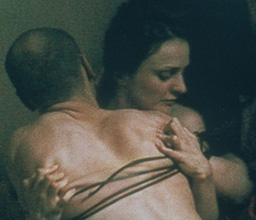Fantômes
Spirits
Jean-Paul Civeyrac
Frankreich 2001 |
| |
|
 |
|
|
Delphi
10.02., 21.30
CinemaxX 3
11.02., 10.00
Arsenal 1
11.02., 15.00
Babylon
12.02., 19.30
|
|
|
|
|
Produktion: Les Films Pelléas, Paris
Weltvertrieb: Flach Pyramide International
5, rue Richepanse, F - 75008 Paris
Tel.: (33 -1) 40 20 05 51
Buch: Jean Paul Civeyrac
Kamera: Céline Bozon
Ton: François Méreu
Schnitt: Béatrice Maleville
Darsteller: Dina Ferreira, Emilie Lelouch,
Guillaume Verdier, Serge Bozon, Vanessa Le
Reste, Armelle Legrand
Format: 35 mm, 1:1.85, Farbe
Länge: 90 Minuten, 25 Bilder/Sek.
Sprache: französisch |
|
|
|
|
In Paris verschwinden Menschen, andere tauchen auf ebenso
mysteriöse Weise wieder auf. Ein Beispiel: Mouche trauert um
Bruno, ihren Geliebten, der bei einem Motorradunfall ums Leben
kam, und ruft so eindringlich nach ihm, dass er zurückkommt.
Als sie sich zu sehr an ihn klammert, sagt Bruno zu ihr – und
das verleiht seiner Figur etwas Vampirhaftes: „Wenn du mich
nicht gehen lässt, wirst du mit mir zusammen verschwinden.“
Sie hält ihn trotzdem fest, und im Morgengrauen sind beide verschwunden.
Man findet nur die Schnur, mit der sie zusammengebunden
waren. Ohne Bruno war Mouche wie ein Spiegel, wenn
man so will, ein Geist im übertragenen Sinn. Jetzt gehört sie
tatsächlich zur Schattenwelt. Dann ist da noch Antoine. Er wird
von einem Geist geweckt: der Erinnerung an seine erste Liebe,
die er verlassen hat, um nach Paris zu gehen. Dieser Geist ist
ebenso beunruhigend wie beruhigend. Beunruhigend, weil er
das Scheitern von Antoines Bemühungen symbolisiert.
Jean Paul Civeyrac: „Wenn man an die Toten denkt, holt man sie
zurück – diese Vorstellung geht auf Maeterlinck zurück,
dessen
symbolistischer Einfluss im Film deutlich zu spüren ist. Ich wollte
eine unstete Welt entwerfen, ein Helldunkel, in Zeitlupe, mit
Szenen, die wie fremdartige Rituale wirken. Ich habe versucht,
eine Art Träumerei zu inszenieren, in der die Lebenden und die
Toten verschmelzen. Ich war auf der Suche nach einer
Atmosphäre der Wunder in einem Paris, das immer mehr vergiftet
wird.“
|
| |
|
|
The subtitle of Spirits is Love Stories For
Today. It is an imaginary film that interweaves
several stories of people in Paris
who either disappear or appear in similarly
mysterious circumstances. For example,
Mouche mourns for Bruno, her lover, who
was killed in a motorbike accident. She
cries out to him every night. Her cries are
so insistent that he returns. Now she won’t
let him go for fear of losing him again, so
Bruno says to her – in a move that makes
his character somewhat vampire-like: “If
you don’t let me go, you’ll have to disappear
with me.“ Without Bruno, Mouche was
a mirror, if you like; a ghost by another
name. Now she truly belongs to the world
of shadows.
Then there is Antoine, who is woken by a
ghost. It is the memory of his first love,
whom he abandoned to go to Paris. This
ghost is as disturbing as it is reassuring.
Disturbing because it symbolises the failure
of all Antoine’s efforts, for he has neither
been able to enter into another relationship
nor realised his goal of becoming
an actor. And yet the ghost is reassuring
because it represents the familiar, smiling
face of the indestructible love given him by
the girl leaning over him. It is a fragile moment.
Time stands still as in a dream.
“In thinking about the dead, we bring them
back – a concept that stems from Maeterlinck,
whose symbolist influence is plain to
see in the film. In this film I wanted to create
an unsettled world, a world of light and
darkness in slow motion with scenes that
appear like alien rituals. I have tried to
produce a kind of dreamlike world in which
the living and the dead blend into one another.
I wanted to conjure up an air of
magic in a Paris that is becoming increasingly
poisoned.” Jean Paul Civeyrac
|
| |
|
Biographien / Biographies
Jean Paul Civeyrac, geb. 1964. Nach einem Philosophiestudium in Lyon Besuch
der Filmhochschule FEMIS, wo er heute als Dozent arbeitet. Filme seit 1990:
La vie selon Luc (1991), Ni d’Ève ni d’ Adam (1997), Les
solitaires (1999), Le doux amour
des hommes, Fantômes (beide 2001).
|
